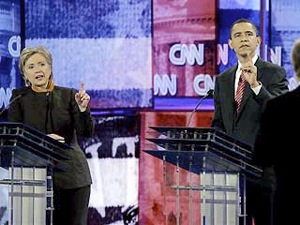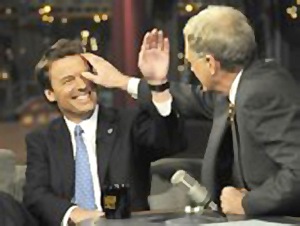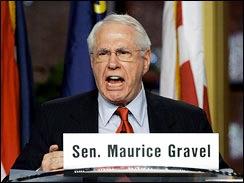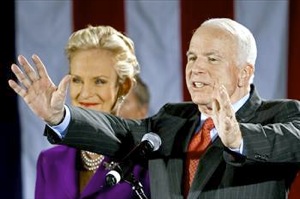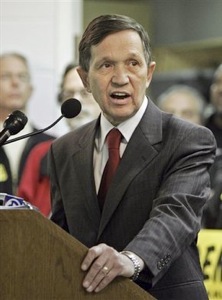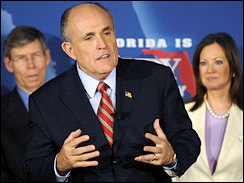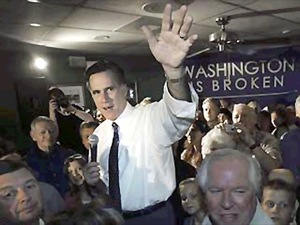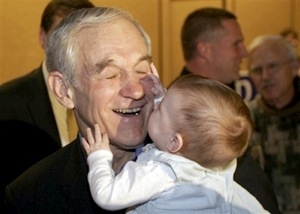feature
Outing the presidential candidates
A look at the reds and the blues on GLBT issues
Published Thursday, 31-Jan-2008 in issue 1049
For gays in states with the largest gay populations, like California, it’s decision time in the 2008 presidential race. From the evidence available – anecdotal and indirect – most gays are trying to choose between the top two Democratic candidates – Hillary Clinton and Barack Obama. For those who will consider only a Republican, the choice appears to have also narrowed to two, also – John McCain, whose record has been relatively moderate on gay-related issues, and Mitt Romney, who battled with front runner McCain in Florida this week. Republican Rudy Giuliani and Democrat John Edwards ended their White House bids Wednesday.
What’s problematic for the GLBT community at this juncture in the presidential contest is that the gay vote – which has provided favored candidates with a significant and reliable voting bloc in the past – is in danger of being marginalized by record voter turnout.
The Las Vegas Sun reported this week that more than 10 times the number of Democrats turned out for that party’s caucuses Saturday than attended four years ago. As many as one-third of the crowd were newly registered Democrats. Records were broken similarly in Iowa and New Hampshire for the Democrats and in South Carolina’s Democratic primary Saturday.
Exit polls in the 2000 and 2004 general elections found about four percent of voters willing to self-identify as gay nationwide, and what few surveys have been conducted, indicate that the vast majority of gays are already registered.
But while the gay vote may seem diminished with a large turnout in the general election, it is magnified in primaries, said political poll analyst Murray Edelman. That’s because most of that gay vote – 77 percent in the 2004 general election – goes Democratic.
The gay vote impact is also magnified in many of the upcoming primary states, such as California, Massachusetts, and Illinois, because of the tendency for many gays to live in or near major metropolitan areas and in states and cities with laws that prohibit discrimination based on sexual orientation. A pre-election survey in 1996, for instance, found that about 8 percent of “likely voters” in California were gay. Census data shows that the states with the highest concentrations of same-sex partner households and the highest percentage of unmarried men and unmarried women include many of the Feb. 5 primary states, including Massachusetts, California, Illinois, and Georgia.
And while history indicates that most GLBT people in the “Super Duper Tuesday” states will be voting for a Democrat, there are some indicators suggesting their choice is still not an easy decision. For some, the differences among the top-polling candidates–in both parties–are subtle distinctions.
But there are differences.
Blue comfort zone
An early benchmark on GLBT issues for Democrats has been, as in 2004, “same-sex marriage.” The early voting states of New Hampshire and Iowa were facing their own fights over the issue during 2007, and marriage is an active battle now in California and Florida. So attention on the issue has been inevitable.
For this campaign, it started with John Edwards in December 2006 when, at his first campaign stop in New Hampshire, a gay man from Massachusetts stood up and asked where he stands on same-sex marriage. Edwards’ response essentially tested the waters for other Democrats as to how comfortable Americans were with the issue.
“It’s easy for me to say civil unions, yes, partner benefits, yes, but it is something I struggle with….It’s a jump for me to get to gay marriage,” said Edwards, who did not immediately endorse Clinton or Obama after dropping out of the race Wednesday.
It wasn’t long before Hillary Clinton and Barack Obama officially entered the race, and they, too, struck similar positions. While Democrats Dennis Kucinich, who recently exited the race, and Mike Gravel have said they support equal marriage rights for same-sex couples, neither has earned a single delegate to the convention and are left out of nationally televised debates.
Polls give a hint at the dilemma for the candidates. Most show a trend toward greater acceptance of equal benefits for same-sex couples through “civil unions” or “domestic partnerships,” but not for legal recognition of “marriage” per se. And the one poll that examined the difference in attitude between Democrats and Republicans – by CBS/New York Times in October 2006 – found that 68 percent of Democrats but only 41 percent of Republicans were for marriage or civil unions. That suggested Democratic candidates needed to show considerable willingness to support some legal recognition for same-sex relationships but still be able to temper that somewhat in the general election.
But there is a difference between Obama and Clinton on marriage: Obama believes the federal Defense of Marriage Act (DOMA) should be repealed, while Clinton says she would repeal only Section 3. That section of the law denies same-sex partners and spouses more than 1,100 federal benefits enjoyed by married heterosexual spouses. She would retain Section 2, which says states don’t have to recognize same-sex “relationships between persons of the same sex.”
Obama also received some criticism last summer for his effort to brush off his refusal to support “marriage” for same-sex couples as being just a matter of “semantics.” He said that, as president, he would “fight hard” to ensure that same-sex couples have the “legal rights that have consequences on an everyday basis,” but he could not promise to fight for more than that. He flatly disagreed with the proposition that a “civil union” is “lesser” than marriage, and he subtly suggested the gay community’s concern that it is “separate but equal” at best and not equal at worst was not a concern that warranted extensive probing.
On the inclusion of information about gays in school education, there is also some distinction. During a nationally televised debate in September, a reporter asked the candidates whether they would be “comfortable” having a story about same-sex marriage between two princes “read to your children as part of their school curriculum?” Edwards, who has two young children and was asked first, said he would “absolutely” be comfortable with it, and added that he wants his children to understand “everything about the difficulty that gay and lesbian couples are faced with every day.”
Obama said he agreed with Edwards and added, “One of the things I want to communicate to my children is not to be afraid of people who are different.
“Because there have been times in our history where I was considered different, or Bill Richardson was considered different,” said Obama. “And one of the things the next president has to do is to stop fanning people’s fears.”
Clinton struck a starkly different chord. She said she believes it should be “a matter of parental discretion” but added she also thinks, “It is better to try to work with children, to help your children to understand there are many differences that are in the world and to really respect other people and the choices that other people make, and that goes far beyond sexual orientation.”
On other issues
The Democratic candidates support the federal Employment Non-Discrimination Act (ENDA), hate-crimes legislation, coverage for domestic partners under the Family and Medical Leave Act, equal treatment of same-sex couples under tax laws and repeal of the military’s “Don’t Ask, Don’t Tell” policy. Obama received considerable criticism from the GLBT community in October when he refused calls to eliminate an anti-gay performer, Donnie McClurkin, from his campaign’s gospel campaign tour of South Carolina. Clinton was criticized for attempting, in response to a debate question, to rewrite history when she claimed that her husband, President Bill Clinton, had signed “Don’t Ask, Don’t Tell” into law as a “transition policy.” Both Obama and Clinton were criticized last spring for initially ducking a question about whether they agreed with then Joint Chiefs of Staff Chair Peter Pace that homosexuality is immoral. They both eventually said they disagreed.
On voting records
In the U.S. Senate, the Human Rights Campaign gave identical grades to Clinton and Obama in the most recently completed 109th session of Congress (2005-2006). The 89 score, on a scale in which 100 is perfect, reflected the failure of both to co-sponsor a bill to provide the partners of U.S. same-sex citizens with the same immigration benefits available to the legal spouses of heterosexual citizens. Clinton earned an 88 in the previous session and a 100 in her first session.
GLBT relations
Clinton has received the lion’s share of high profile endorsements in the GLBT community, among them: Reps. Barney Frank and Tammy Baldwin; former HUD assistant secretary Roberta Achtenberg; tennis legend Billie Jean King; and California State Senator Sheila Kuehl. She has openly gay staff heading up her outreach to the GLBT community and spoke before a Human Rights Campaign gathering, albeit without any prior notice to the press. She gave a reporter for The Advocate a 15-minute interview, but her campaign has refused to respond to any other requests for interviews from the GLBT press.
Obama has the backing of: film producer David Geffen; Equality Illinois Director Rick Garcia; and Colorado activist Donna Red Wing. He has openly gay liaisons to the gay community and met in person, albeit without press notice, with a Freedom to Marry group in New Hampshire. He gave a reporter for The Advocate a 15-minute phone interview in regard to the gospel-tour controversy, but his campaign did not respond to any other requests for interviews from the GLBT press. It is not clear to whom Edwards’ supporters will shift their endorsement.
Edwards had the support of longtime Democratic activist David Mixner and youth advocate Kevin Jennings. He had an openly gay person as his deputy campaign manager and met in person with a Freedom to Marry group in New Hampshire, with no restrictions on, but no notice to, the press, at their offices. His campaign did not responded to requests for interviews from the GLBT press. It is not clear to whom Edwards’ supporters will shift their endorsement.
The most recent reports from the Federal Elections Commission show that of contributions to Clinton and Obama from 33 precincts around the country with the heaviest concentration of gays, 51 percent has gone to Clinton and 38 percent to Obama. Eleven percent has gone to Edwards.
The Red rip tide
About one in four gay voters cast their ballots for Republican presidential candidate George Bush in 2000 and 2004. Patrick Sammon, president of the national gay Republican group, Log Cabin Republicans, said the group hasn’t endorsed a candidate yet, and that its bylaws prevent local clubs from doing so, even in the primaries. He declined to comment on which candidates gay Republicans seem to be favoring.
The most gay-supportive candidate among the GOP candidates, former New York City Mayor Rudy Giuliani, backed out of the race Wednesday. Headed into the Jan. 29 primary in Florida and the Feb. 5 primaries and caucuses in almost two dozen states, Mitt Romney is on top. Romney not only backed off his one-time support for equal rights for gays but has come to tout his opposition to them, especially in the area of marriage licensing.
Like most of the Democratic candidates, all the Republicans have been against legal recognition for same-sex marriage. One possible exception is Rep. Ron Paul. Early on, Paul stated he believes “all voluntary associations, whether they’re economic or social, should be protected by the law.” More recently, when an ABC interviewer asked him, “Should gays be allowed to marry?” he replied, “Sure.” But then he added that, while same-sex couples “can do whatever they want,” they “can’t make me, personally, accept what they do,” and he thinks “all governments” should simply be out of the marriage licensing business.
All the Republican candidates oppose civil unions.
Early on, Giuliani, Paul, John McCain and Fred Thompson were the only Republican candidates to oppose amending the U.S. Constitution to ban same-sex marriage. Now, only McCain and Paul stick to that view. McCain has consistently spoken out against and voted against the Federal Marriage Amendment. Paul has opposed it as a matter of his belief that marriage is strictly a state issue. Thompson has refined his position several times, landing behind an idea of supporting an amendment “which says some off the wall court decision in one state that recognizes a marriage … cannot go to another state and have it recognized in that state.”
On other issues
None of the Republican candidates have expressed support for ENDA or for repealing “Don’t Ask, Don’t Tell.”
On voting records
In the past three Congressional sessions, McCain has earned failing marks from the Human Rights Campaign’s Congressional Scorecard – between 14 and 33, on a scale of zero to 100. Paul has earned between zero and 38.
GLBT relations
No GLBT groups or prominent gay leaders have endorsed Republican candidates for president during this campaign. The most recent FEC reports show that 54 percent of contributions to the top three Republicans from the 33 precincts around the country with the heaviest concentration of gays has gone to Giuliani, 27 percent to McCain, and 20 percent to Romney.
|
|
Copyright © 2003-2025 Uptown Publications

